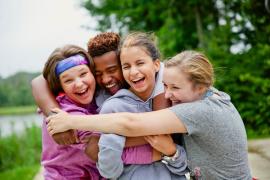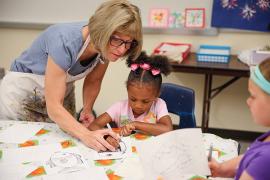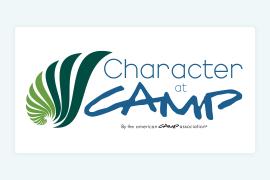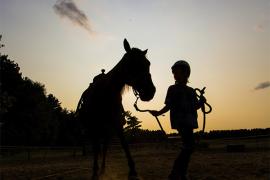In fall 2015, our organization, Challenge Success, launched a research-practice partnership with three northern California camps. These camps believed deeply — like many of you — that summer camp provides kids with long-term benefits and essential learning experiences, but they wanted to better understand if and how this was true.
As an education research organization affiliated with the Graduate School of Education at Stanford University, we thought it was an exciting opportunity to investigate camp as a unique learning environment. Our goals were two-fold: 1) to provide each camp with their own data for use in reflecting on and improving their programs (evaluation), and 2) to analyze data from the project and share our findings with the broader camp community (research).
Our work started, as much research and evaluation does, by working with our camp partners to develop a logic model that clearly identified the intended outcomes, or benefits, they believed kids receive by coming to camp. For our partner camps, these included better communication and collaboration skills, empathy and perspective taking, initiative and perseverance, and improved relationship-building skills, among others. In the logic model, we labeled these skills “short-term outcomes” of camp, and we explored how and if they were ultimately connected to the skills and competencies kids need in the long term for academic, career, and relationship success.
It was immediately clear to us that the outcomes identified by our camps were closely aligned with the current education research on social and emotional learning (SEL) and effective learning environments.
For example, we know from existing research that social and emotional skills are critical to young people’s academic success (Farrington et al., 2012), and that children must have the opportunity to practice and develop SEL skills such as empathy, perseverance, and collaboration, in order to thrive in careers, in family, and in community as adults (CASEL, 2015; Farrington et al., 2012; Pellegrino & Hilton, 2012). We also know that out-of-school settings offer an important space for kids to develop these competencies (Devaney, 2015; Durlak, Weissburg, & Pachan, 2010). In particular, summer camp — an immersive and highly social experience — offers great potential to foster the development of such SEL skills.
Research also tells us that effective learning environments are ones where kids have a sense of physical and emotional well-being, a strong sense of belonging, and are engaged — affectively (interest, fun, enthusiasm), behaviorally (active participation), and cognitively (reflecting, making choices, having opportunities to give input) (Conner & Pope, 2013; Osterman, 2000).
Our study draws from this existing research and was designed to examine the ways in which camp is a learning environment that provides kids with opportunities to practice and develop SEL skills.
Over the last two summers we collected nearly 10,000 surveys (camper, counselor, and parent) and observations at six different day and resident camps — including the three original camps and three additional camps that joined the study last summer. We are currently sharing our findings with each of our partner camps and are already seeing them make many small “tweaks” in response. In fact, our camps are planning changes to programs, activities, and staff training to intentionally enhance camper learning opportunities. All exciting early benefits from our work!
Our next step is to analyze the data we’ve collected across all six camps and share what we’ve learned with the broader camp community. While we know that not every camp can engage in a large evaluation process, we hope that our findings will be useful to others and inspire reflection about how camps can excel as high quality learning environments where kids can practice many of the essential skills they need for school, job, and relationship success. Stay tuned!
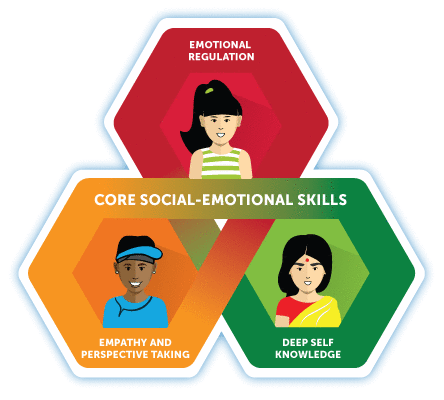
Graphic courtesy of KnowledgeWorks Foundation.
References
CASEL. (2015). CASEL Guide. http://www.casel.org/middle-and-high-school-edition-casel-guide/
Conner, J.O., & Pope, D.C. (2013). Not just robo-students: Why full engagement matters and how schools can promote it. Journal of Youth and Adolescence, 42(9), 1426 – 1442.
Devaney, E. (2015). Supporting Social and Emotional Development Through Quality Afterschool Programs.
Durlak, J. A., Weissburg, R. P., & Pachan, M. (2010). A Meta-Analysis of After-School Programs That Seek to Promote Personal and Social Skills in Children and Adolescents. American Journal of Community Psychology, 45, 294–309. http://doi.org/10.1007/s10464-010-9300-6
Farrington, C. A., Roderick, M., Allensworth, E., Nagaoka, J., Keyes, T. S., Johnson, D. W., & Beechum, N. O. (2012). Teaching Adolescents To Become Learners: The Role of Noncognitive Factors in Shaping School Performance : A Critical Literature Review.
Pellegrino, J. W., & Hilton, M. L. (Eds.). (2012). Education for Life and Work: Developing Transferable Knowledge and Skills in the 21st Century. National Academies Press.
Lisa Westrich, LCSW is the director of programs at Challenge Success, a national school reform organization affiliated with Stanford University’s Graduate School of Education. She supports the organization’s core programs and research efforts. Previously, Lisa was a research and policy analyst at Stanford’s John W. Gardner Center where she partnered with educational institutions and community-based organizations to improve outcomes for youth. She has worked with children and families in a variety of education and nonprofit settings, with an emphasis on positive youth development, for 25 years.
Denise Pope, PhD is co-founder of Challenge Success and a senior lecturer at the Stanford University Graduate School of Education, where she specializes in student engagement and curriculum studies. She is the author of ‘Doing School’: How We Are Creating a Generation of Stressed Out, Materialistic, and Miseducated Students (Yale University Press, 2001) and co-author of Overloaded and Underprepared: Strategies for Stronger Schools and Healthy, Successful Kids (Jossey-Bass, 2015). She lectures nationally on parenting techniques and pedagogical strategies to increase student health, engagement with learning, and integrity.
Photo courtesy of Camp Harlam in Kunkletown, Pennsylvania
The views and opinions expressed by contributors are their own and do not necessarily reflect the views of the American Camp Association or ACA employees.


